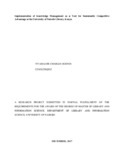| dc.description.abstract | University libraries are knowledge hubs established in support of the mission of their parent
institutions. Most of the libraries have significantly developed and are utilizing some
Knowledge Management (KM) principles to increase their operational efficiency to meet this
mandate. Knowledge management offers new ways of enhancing competitive edge despite
the challenges occasioned by, among other factors, dwindling library budgets, competition,
and user approach to information access and retrieval. The aim of the study was to
investigate the implementation of Knowledge Management as a tool for sustainable
competitive advantage at the University of Nairobi Library. The study was guided by the
following objectives: to determine the extent to which knowledge management is practiced at
the University of Nairobi Library; to determine which KM strategies can generate sustainable
competitive advantage for the University of Nairobi Library; to evaluate the effectiveness of
Knowledge Management as a source of sustainable competitive advantage for the University
of Nairobi Library; and to identify the challenges encountered in implementing knowledge
management strategies for sustainable competitive advantage in University of Nairobi
Library. This research is a case study which was conducted at the University of Nairobi
Library. The study used a descriptive research design and purposive sampling technique.
Qualitative and quantitative methods were used to analyze data. Questionnaires and interview
guide were used to collect data for the study. Data from the returned questionnaires was
analyzed using Statistical Packages for Social Sciences (SPSS) and Microsoft Excel
software. The analyzed data has been presented using pie charts, tables and graphs. This
research made the following findings: the UON library has no central KM policy and its
implementation is at the introductory stage, there is no organizational culture which promotes
knowledge creation, sharing, retention and reuse, among other challenges. Therefore, the
following conclusions were made: formulation and implementation of a knowledge strategy
covering policy formulation, knowledge creation, sharing, retention and reuse and training
staff in Knowledge Management. The findings of the study add to the body of knowledge in
KM practice in university libraries and for library professionals wishing to leverage KM in
their libraries will find the research results quite informative. | en_US |



